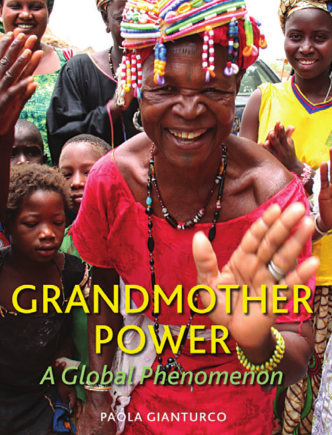Photojournalist Visits National Writers Series
Sept. 9, 2016
 To Show How Grandmas Change the World
To Show How Grandmas Change the World Grandmothers as global agents of change — it’s a notion that runs counter to the stereotype. But Paola Gianturco has traveled the world to gather stories and photos of grandmothers who are determined to improve circumstances for future generations.
Gianturco, author of Grandmother Power: A Global Phenomenon comes to Traverse City on Sept. 17 to show how grandmothers are doing their part to help the next generation. Gianturco will appear in Milliken Auditorium on the Northwestern Michigan College campus as part of the National Writers Series. Her photos will be exhibited at the adjoining Dennos Museum.
From June 2009 through February 2011, she visited a total of 120 activist grandmothers in places as diverse as South Africa, Peru, the United Arab Emirates, Thailand, Guatemala, Israel, Argentina, Philippines, Swaziland, Laos, Senegal, Ireland, and India. For a dose of grandmothers dealing with “first-world” issues, she also covered U.S.-based factions of the international environmental activist organization “Raging Grannies” and became inspired by similar women’s groups in Canada that raised $13 million to help grandmothers who are caring for AIDS orphans in 15 African countries.

“Many of these women had lost their own children to AIDS,” she said.
Of course, the problems Gianturco found grandmothers addressing differed greatly from country to country.
Those in Argentina looked for their children or grandchildren who had disappeared during the junta, a bloody war against Marxism that raged from the early ’70s to 1983.
Their counterparts in India worried about their grandkids getting lung disease from kerosene lamps.
Out of concern for livelihoods, community health and, above all, the welfare of family members, grandmothers in Thailand fought the country’s cyanide pollution of cotton fields and groundwater.
In a village in Guatemala, fathers expected to be their daughter’s first sexual partners — a practice that seems unimaginably cruel. Grandmothers used gentle persuasion and patience to teach the ills of this tradition.
In the Philippines, grandmothers who in their youth had been kidnapped by the Japanese Army and used as sex slaves during WWII sued for reparations and an official government apology, hoping to ensure their suffering will not be repeated.
Senegalese grandmothers learned that many young women were dying during childbirth because of the effects of female genital mutilations, so they fought to end the practice and reduce teen pregnancy and child marriage. That battle took years of hard work, but eventually succeeded by gaining the support — and the respect — of local religious and school leaders.
Gianturco said that for all their geographic and cultural differences cited in her book, these grandmother-led movements have a common denominator.
“They’ve all been initiated by grandmothers who have looked at local, national or international problems and have said, ‘This isn’t good enough for my grandchildren.’ That discovery propelled them to do something about it.” During her travels, Gianturco, a grandmother herself, was surprised that no matter how tough the issues or the degree of poverty, the women she met tended to stick together and find ways to enjoy life.
“There was joyousness they found in working in groups,” she said. “It amazed me how many places I saw where they were dancing, having a good time together. Clearly, they aren’t sitting in rocking chairs. That old image is just not accurate. These are true activists.”
“Grandmothers are gangbusters — they help change the world,” Gianturco said. “I hope that grandmothers everywhere will become activists. That’s my great dream.”
“And they don’t have to go to the other side of the world to do it,” she added.
Grandmothers in the U.S., she said, have demographics on their side.
“The average age of a grandma in this country is 47 now — much younger that many people think. And there are 42 million grandmas in the States. Many of them came of age in the ’60s, so they know they can change the world because they already did.”
Gianturco previous books are “Women Who Light the Dark” (2007), “Viva Colores! A Salute to the Indomnitable People of Guatamalia” (2006), “Celebrating Women” (2004) and “In Her Hands, Craftswomen Changing the World” (2004).
All author royalties from “Grandmother Power” will be donated to the Stephen Lewis Foundation’s Grandmothers to Grandmothers campaign. Gianturco’s Sept. 17 appearance here is a homecoming of sorts. She has longstanding ties to the Grand Traverse region. Her father built a cabin here in the 1950s. “I still have many friends around the area,” she said.
“Grandmother Power” won the 2012 Book of Year award for Women’s Studies by Traverse City-based ForeWord Reviews and the 2013 International Book Award for Multicultural Nonfiction. It was About.com’s 2013 Readers’ Choice Award in the category of Favorite Grandparenting Book.
Trending

The Valleys and Hills of Doon Brae
Whether you’re a single-digit handicap or a duffer who doesn’t know a mashie from a niblick, there’s a n... Read More >>
The Garden Theater’s Green Energy Roof
In 2018, Garden Theater owners Rick and Jennie Schmitt and Blake and Marci Brooks looked into installing solar panels on t... Read More >>
Earth Day Up North
Happy Earth Day! If you want to celebrate our favorite planet, here are a few activities happening around the North. On Ap... Read More >>


